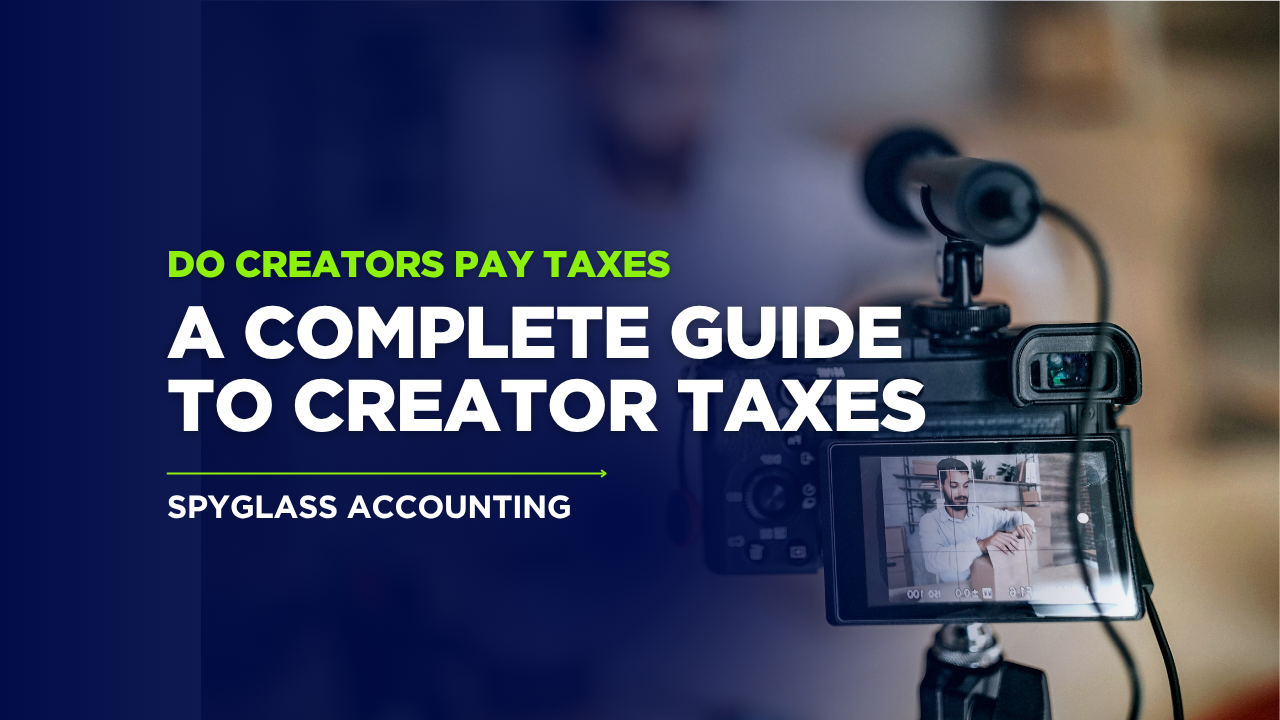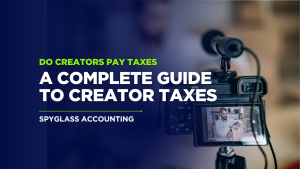
Do Creators Pay Taxes on Money Earned? A Complete Guide to Creator Taxes
Introduction: The Rise of the Creator Economy
From Instagram influencers and TikTok dancers to YouTube vloggers, OnlyFans models, and Twitch streamers, the Creator Economy has exploded in recent years. What was once a passion project or hobby during pandemic lockdowns is now a thriving, multi-billion-dollar industry. But with income comes responsibility—particularly tax responsibility. Many creators are now discovering that earning online income means navigating a new world of creator taxes.
So, do creators pay taxes on money earned? The short answer: yes. The IRS sees you as self-employed, and with that classification come specific filing requirements, responsibilities, and yes—opportunities for deductions.
In this in-depth guide from Spyglass Accounting and Financial Services, we’ll decode everything content creators need to know about creator taxes: from when to report your income to what deductions you can claim, what forms to expect, and how to avoid penalties.

- Are You Considered Self-Employed as a Creator?
If you earn income from content creation and don’t receive a W-2 from an employer, you’re considered self-employed in the eyes of the IRS. This includes:
- Brand deals
- Sponsored content
- Affiliate commissions
- Ad revenue (YouTube, Twitch, etc.)
- Subscriber platforms (OnlyFans, Patreon)
- Merchandise sales
- Tips via PayPal, Venmo, or Cash App
Key takeaway: If you earned $400 or more in net income from your creative work, you must file a tax return.
- When Do You Have to Report Your Income?
Creator income must be reported in the tax year it was earned. Even if you didn’t receive a 1099 form, you are still legally obligated to report it. This includes payments made in-kind (free products or services in exchange for content) if they have fair market value.
Reporting thresholds:
- Form 1099-NEC: Issued if you earned $600+ from a company or brand
- Form 1099-K: Issued if you earned $5,000+ (2024 threshold) through third-party platforms like PayPal or Stripe
Tip: Keep detailed records of all income sources, even if you don’t receive tax documents.
For help tracking your finances, check out our guide: Bookkeeping Tips for Small Business Owners
- Understanding Self-Employment Tax
Unlike traditional employees, creators must pay both the employer and employee portion of Social Security and Medicare taxes. This is called Self-Employment Tax, and it totals 15.3%:
- 12.4% for Social Security
- 2.9% for Medicare
Bonus: You can deduct half of this tax when calculating your adjusted gross income (AGI).
For example, if you earned $50,000 in net income:
- You would owe about $7,650 in self-employment tax
- But you can deduct $3,825 from your AGI
To learn more about AGI and other tax acronyms, read our guide: Common and Complex Tax Acronyms Decoded

- What Forms Will You Use to File as a Creator?
As a self-employed individual, you’ll need to file:
- Form 1040: Your individual income tax return
- Schedule C: To report business income and expenses
- Schedule SE: To calculate self-employment tax
You may also receive:
- 1099-NEC for direct payments
- 1099-K for payments via third-party apps
Important: Even if you don’t receive a 1099 form, you still must report all income.
- What Business Expenses Are Deductible from Creators Taxes?
The silver lining of being self-employed? Tax deductions. Creators can reduce their taxable income by writing off ordinary and necessary business expenses.
Top tax-deductible expenses for creators:
- Camera and video equipment
- Laptops, smartphones, and accessories
- Editing software (e.g., Adobe Premiere, Final Cut)
- Home office setup (proportional to space used for work)
- Internet and utilities (a portion)
- Travel costs (related to shoots or collabs)
- Business-related meals and entertainment
- Website hosting and domain fees
- Marketing and promotions (ads, social media boosts)
- Professional services (accountants, consultants)
Use our Tax Deductions Checklist to make sure you’re not leaving money on the table.
- Quarterly Estimated Creator Taxes: Avoiding the Surprise Tax Bill
Creators who expect to owe $1,000 or more in taxes must pay quarterly estimated taxes to the IRS. These are due:
- April 15
- June 15
- September 15
- January 15 (of the following year)
Failing to pay these may result in penalties and interest.
We recommend using bookkeeping software or hiring a professional (like Spyglass!) to estimate your creator taxes each quarter. Read more about our tax planning services.

- Common Tax Mistakes Creators Make
- Not tracking income properly
- Mixing personal and business expenses
- Missing quarterly payments
- Overlooking deductions
- Waiting until the last minute to file
Pro Tip: Open a separate bank account and credit card for your creator business. This makes tax season MUCH easier.
- Should You Form an LLC or S Corp as a Creator?
As your income grows, it may be beneficial to consider incorporating.
- LLC (Limited Liability Company): Offers legal protection and can help you appear more professional
- S Corporation: Can potentially reduce your self-employment tax burden if your income exceeds $80,000/year
Before you make any moves, consult with an accountant. Learn more in our post: LLC vs. Sole Proprietorship: What’s Best for You?
- Do You Need a Tax Professional or Can You DIY?
If you’re just starting and your finances are straightforward, you might use tax software. But as your brand grows and your income becomes more complex, it’s wise to work with a tax professional.
At Spyglass Accounting and Financial Services, we specialize in working with creators, influencers, and small business owners. Whether it’s year-round bookkeeping, tax prep, or IRS representation, we’ve got your back.
Contact us today for a free consultation and let us help you simplify your finances.
- Final Thoughts: Creator Taxes Don’t Have to Be Scary
The rise of the Creator Economy is one of the most exciting developments in today’s digital world. But as the IRS takes note, creators must treat their content businesses like real businesses.
With proper planning, documentation, and guidance, you can take full control of your finances and avoid tax-time surprises.

Need help with your taxes as a content creator? Spyglass Accounting and Financial Services is here to guide you through every step of your self-employed tax journey.
Useful Internal Resources: